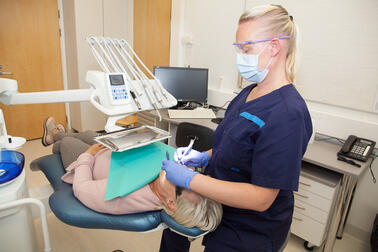
Contact on the same day
In the future, you must be able to get through to primary healthcare and dental care during the same working day you make contact. The client's need for treatment is assessed at the same time.
Within Helsinki, primary healthcare can be accessed through digital avenues like the chatbot Sotebotti Hester, Omaolo, and Maisa. Moreover, health stations and dental care offer callback services.
"In order to make our service as smooth as possible, we hope that clients will reach out to us only once for a given matter. Clients have the flexibility to choose the contact method that suits them best," says Leena Turpeinen, Director of Health and Substance Abuse Services.
Access to treatment at health stations gradually becoming quicker
In the future, it will usually be possible to receive non-urgent treatment at Helsinki's health stations within a 14-day window. Nonetheless, not all health stations will immediately meet these targeted wait times at the beginning of September.
"Unfortunately, due to the prolonged pandemic and shortage of personnel, the clearance of care and service backlogs has experienced delays. Consequently, access to non-urgent treatment has not improved as swiftly as we had aspired," Turpeinen says.
"We've remained steadfast, actively refining the operational approaches of health stations to ensure better client service. This year, innovative methods for client service have been conceptualised and trialed at Kivikko Health Station, yielding promising outcomes in terms of quicker access to treatment. The practices honed at Kivikko have also been integrated into other health stations, and this endeavour persists. Additionally, we will expand the utilisation of service vouchers and continue developing electronic services," Turpeinen adds.
In Kannelmäki and Ruoholahti, services are offered through a private partner as part of an experimental initiative.
"We vigilantly track the progress of these experiments, drawing lessons from each other's effective strategies," Turpeinen continues.
The maximum waiting times apply to the entirety of primary healthcare. This encompasses not only health stations and dental care but also centralised contraceptive counselling and physiotherapy, among other services in Helsinki.
Furthermore, these maximum waiting times extend to low-threshold mental health services provided by Mieppi service units, of which there are four spread across Helsinki.
Service vouchers ensure access to dental care
For non-urgent concerns, dental care predominantly offers clients a service voucher, granting immediate or, at the latest, one-month access to treatment from a private service provider. Efforts are underway in Helsinki to ensure that, moving forward, treatment at the city's dental clinics can be accessed within a four-month timeframe.
"Our utmost priority is to ensure that, for non-urgent matters, clients can secure treatment at health stations within two weeks and dental care within four months. In cases of urgency, same-day treatment is attainable if required," concludes Leena Turpeinen.
The waiting times for treatment at health stations and access to dental care in Helsinki are regularly published online.
To find out more about the national reform of the treatment time guarantee, go to the website of the Ministry of Social Affairs and Health(Link leads to external service) .


